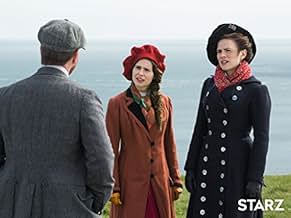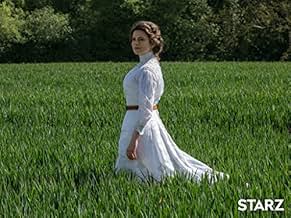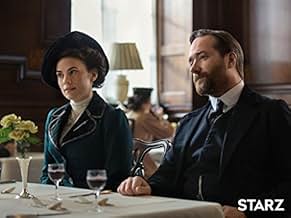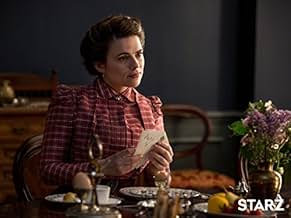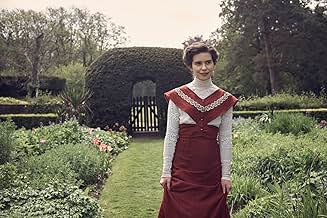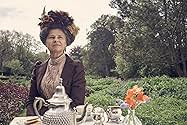The social and class divisions in early 20th century England through the intersection of three families - the wealthy Wilcoxes, the gentle and idealistic Schlegels and the lower-middle class... Read allThe social and class divisions in early 20th century England through the intersection of three families - the wealthy Wilcoxes, the gentle and idealistic Schlegels and the lower-middle class Basts.The social and class divisions in early 20th century England through the intersection of three families - the wealthy Wilcoxes, the gentle and idealistic Schlegels and the lower-middle class Basts.
- Nominated for 1 BAFTA Award
- 1 win & 12 nominations total
Browse episodes
Featured reviews
I'm writing this review after episode 2, mainly to counter some of the other overly critical reviews of Howard's End.
I loved the movie version with Emma Thompson and Anthony Hopkins, but I feel this miniseries version can explore further some of the issues and topics E.M. Forster touched on in his book; class, gender, nationality etc. Also the mirrored circumstances across the class divide and how characters deal with them
As regards race and some of the casting i.e. the housemaid and Jacky Bast, I think they were interesting choices and one Forster would have approved of. He was a fierce opponent of racism (especially anti-anti-semitism) and, to answer another question a reviewer posed, yes there were black people in Edwardian London, all part of the class struggles of the period.
The cast are all excellent, especially Hayley Atwell and Philippa Coulthard. The costumes and cinematography are great. In the first episode the background music seemed rather loud and obtrusive, but this wasn't a problem for me in episode 2. I'm looking forward to episodes 3 & 4.
To those who say it's slow and nothing happens, I'm not sure what to say. Maybe watch the other channel with 'I'm a celebrity get me out of here' on it, or a Transformers movie.
I loved the movie version with Emma Thompson and Anthony Hopkins, but I feel this miniseries version can explore further some of the issues and topics E.M. Forster touched on in his book; class, gender, nationality etc. Also the mirrored circumstances across the class divide and how characters deal with them
As regards race and some of the casting i.e. the housemaid and Jacky Bast, I think they were interesting choices and one Forster would have approved of. He was a fierce opponent of racism (especially anti-anti-semitism) and, to answer another question a reviewer posed, yes there were black people in Edwardian London, all part of the class struggles of the period.
The cast are all excellent, especially Hayley Atwell and Philippa Coulthard. The costumes and cinematography are great. In the first episode the background music seemed rather loud and obtrusive, but this wasn't a problem for me in episode 2. I'm looking forward to episodes 3 & 4.
To those who say it's slow and nothing happens, I'm not sure what to say. Maybe watch the other channel with 'I'm a celebrity get me out of here' on it, or a Transformers movie.
Love the book, and EM Forster's other work, and the 1992 film is not only one of the best Forster adaptations it is a wonderful film in its own right. BBC have done a lot of very good to outstanding period drama adaptations and the cast are a talented lot, so a large part of me was really looking forward to their adaptation of 'Howard's End'.
Watching all four episodes, found myself finding a lot to like about 'Howard's End' (2017) but feeling also it had its short-comings that stopped me from loving it. Of this and the 1992 film, as unfair it would seem to compare, there is no question which is the better one of the two, with the 2017 adaptation lacking the nuanced depth, emotion and elegance of the film.
There is a lot to like about 'Howard's End' (2017). It is impeccably made visually, with the period detail sumptuous and evocative, stylish costumes, beautiful photography and even more beautiful scenery/locations. The direction is admirably restrained without being pedestrian.
'Howard's End' (2017) is intelligent and controlled, doing a lovely job exploring Forster's many themes and insights that still hold relevance and provoke thought today (at least to me). Appreciated the subtle, restrained approach to the storytelling, and on the most part keeps the many layers and characterisation interesting.
Casting is also strong, with the standouts being Hayley Atwell, capturing Margaret's good intentions, spirit and emotional repression with ease, and a movingly poised Julia Ormond. Matthew MacFadyen brings a suitable amount of charisma. A lot of talk has been made about the diversity, this didn't bother me at all and am sure Forster himself wouldn't have been bothered by it, it didn't seem jarring and to me it seems to be something insignificant blown out of proportion.
On the other hand, as indicated, 'Howard's End' had its shortcomings. The first episode was something of a slow starter, it needed more zest and tighter pacing for an episode that felt more like set up than anything else. Stick with it though, because the other three episodes improve on this when the story and characters become richer and deeper. Timeline changes could have been clearer, sometimes it did feel jumpy and one doesn't know how much time has passed.
For me, and quite a few others it seemed, the music was a bit too intrusive and the sound could have been toned down. While the cast were on the most part very impressive, Tracy Ullman overdoes it a bit.
In summary, good but could have been more. 7/10 Bethany Cox
Watching all four episodes, found myself finding a lot to like about 'Howard's End' (2017) but feeling also it had its short-comings that stopped me from loving it. Of this and the 1992 film, as unfair it would seem to compare, there is no question which is the better one of the two, with the 2017 adaptation lacking the nuanced depth, emotion and elegance of the film.
There is a lot to like about 'Howard's End' (2017). It is impeccably made visually, with the period detail sumptuous and evocative, stylish costumes, beautiful photography and even more beautiful scenery/locations. The direction is admirably restrained without being pedestrian.
'Howard's End' (2017) is intelligent and controlled, doing a lovely job exploring Forster's many themes and insights that still hold relevance and provoke thought today (at least to me). Appreciated the subtle, restrained approach to the storytelling, and on the most part keeps the many layers and characterisation interesting.
Casting is also strong, with the standouts being Hayley Atwell, capturing Margaret's good intentions, spirit and emotional repression with ease, and a movingly poised Julia Ormond. Matthew MacFadyen brings a suitable amount of charisma. A lot of talk has been made about the diversity, this didn't bother me at all and am sure Forster himself wouldn't have been bothered by it, it didn't seem jarring and to me it seems to be something insignificant blown out of proportion.
On the other hand, as indicated, 'Howard's End' had its shortcomings. The first episode was something of a slow starter, it needed more zest and tighter pacing for an episode that felt more like set up than anything else. Stick with it though, because the other three episodes improve on this when the story and characters become richer and deeper. Timeline changes could have been clearer, sometimes it did feel jumpy and one doesn't know how much time has passed.
For me, and quite a few others it seemed, the music was a bit too intrusive and the sound could have been toned down. While the cast were on the most part very impressive, Tracy Ullman overdoes it a bit.
In summary, good but could have been more. 7/10 Bethany Cox
... I much preferred the 1992 Emma Thompson/Anthony Hopkins/James Ivory movie version. Perhaps I'm too much a fan of Merchant Ivory films. It's a pleasure watching Matthew Macfadyen in anything. And I look forward to future roles for Hayley Atwell. It's not that this mini-series version is inferior. It simply didn't arouse as much of my sympathy for any of the characters as the 1992 version.
I really have enjoyed the series but some of the casting just is so out of place it's incredibly distracting. At first I was confused by the doctor treating an upper middle class family in Edwardian England being Asian. Then with the servant being black which would have been extremely unusual but not entirely implausible. But then with an interracial marriage that raises NO eyebrows? It stretches incredulity and pulls you directly out of the story.
Colorblind casting only works when it's not impossible in the actual story. In this case it's so improbable it's distracting. I don't understand the thought process involved in casting a classic like this. Especially where it would make massive changes to the story if the characters are not white as that was the reality of the era.
That said, the cast handled their jobs brilliantly and it was charmingly done.
Colorblind casting only works when it's not impossible in the actual story. In this case it's so improbable it's distracting. I don't understand the thought process involved in casting a classic like this. Especially where it would make massive changes to the story if the characters are not white as that was the reality of the era.
That said, the cast handled their jobs brilliantly and it was charmingly done.
This series is quite beautiful in terms of scenery, score and cinematography, and though the dialogue is a bit meandering and often feels to be of little consequence I did enjoy the dynamic between the three siblings and their aunt.
The main issue I have with the series is the total lack of chemistry between any of the romantic pairs. Absolutely none of their relationships felt believable.
The only characters I felt had any potentially sexual chemistry was Mrs Wilcox and Margaret, so to see Margaret later paired with the bland, unlovable and callous Mr Wilcox was baffling. The feelings which they supposedly have for each other do not read as authentic, and so Margaret becomes a less likeable character as a consequence.
Furthermore, several pieces of the story feels disjointed - I'm thinking particularly of the space between episodes 1 and 2 and the of end; both places where large amounts of time is skipped over. This kind of skipping is of course typical of epilogues, but in this case it felt weirdly jarring. They were obviously trying to wrap the series up in a neat little bow, but if felt anything but neat.
Without spoiling the end, the events which lead to the resolution seemed extremely cheap and almost offensive in how certain characters were disposed of.
If nothing else the series did make me curious to read the book Howard's End and see whether the series fails due to going too far away from the source material, or not having the proper means to give the source material life.
The main issue I have with the series is the total lack of chemistry between any of the romantic pairs. Absolutely none of their relationships felt believable.
The only characters I felt had any potentially sexual chemistry was Mrs Wilcox and Margaret, so to see Margaret later paired with the bland, unlovable and callous Mr Wilcox was baffling. The feelings which they supposedly have for each other do not read as authentic, and so Margaret becomes a less likeable character as a consequence.
Furthermore, several pieces of the story feels disjointed - I'm thinking particularly of the space between episodes 1 and 2 and the of end; both places where large amounts of time is skipped over. This kind of skipping is of course typical of epilogues, but in this case it felt weirdly jarring. They were obviously trying to wrap the series up in a neat little bow, but if felt anything but neat.
Without spoiling the end, the events which lead to the resolution seemed extremely cheap and almost offensive in how certain characters were disposed of.
If nothing else the series did make me curious to read the book Howard's End and see whether the series fails due to going too far away from the source material, or not having the proper means to give the source material life.
Did you know
- TriviaHayley Atwell and Matthew McFadyen worked to together in "The Pillars of the Earth" in 2010.
- ConnectionsReferenced in Honest Trailers: The Oscars (2017) (2017)
Details
- Release date
- Countries of origin
- Official site
- Languages
- Also known as
- Howards End
- Filming locations
- Myddleton Square, Clerkenwell, London, England, UK(Schlegels' house)
- Production companies
- See more company credits at IMDbPro
Contribute to this page
Suggest an edit or add missing content








